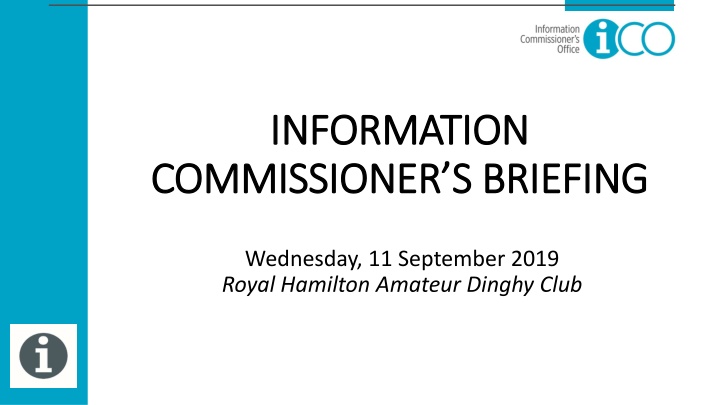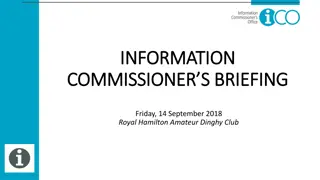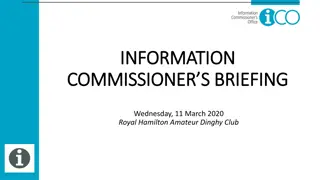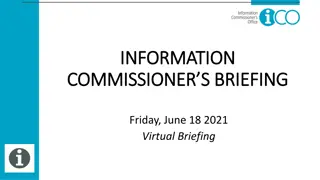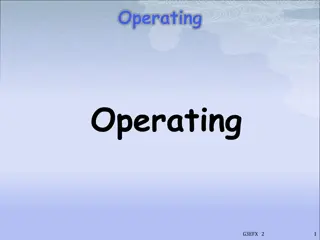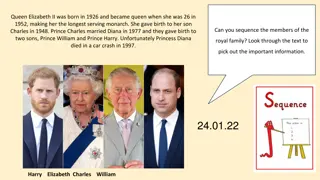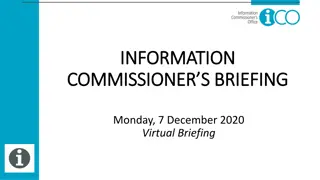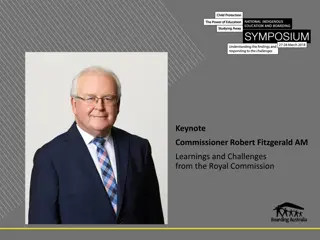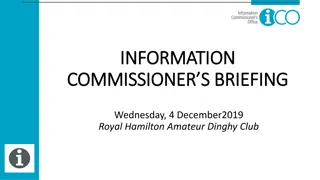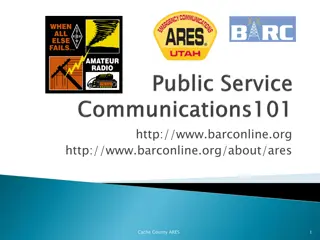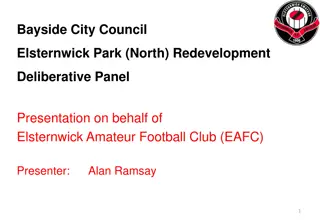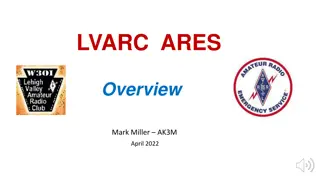Information Commissioner's Briefing at Royal Hamilton Amateur Dinghy Club
The Information Commissioner's Briefing held at Royal Hamilton Amateur Dinghy Club covered topics related to the Public Access to Information Act in Bermuda. The briefing emphasized the rights of Bermudians and residents to access public records, the role of the Information Commissioner in promoting information access, and processes for resolving disputes over record access.
Download Presentation

Please find below an Image/Link to download the presentation.
The content on the website is provided AS IS for your information and personal use only. It may not be sold, licensed, or shared on other websites without obtaining consent from the author.If you encounter any issues during the download, it is possible that the publisher has removed the file from their server.
You are allowed to download the files provided on this website for personal or commercial use, subject to the condition that they are used lawfully. All files are the property of their respective owners.
The content on the website is provided AS IS for your information and personal use only. It may not be sold, licensed, or shared on other websites without obtaining consent from the author.
E N D
Presentation Transcript
INFORMATION INFORMATION COMMISSIONER S BRIEFING COMMISSIONER S BRIEFING Wednesday, 11 September 2019 Royal Hamilton Amateur Dinghy Club
AGENDA AGENDA 9:00 9:10 9:10 10:15 Welcome and Introductions to the ICO A record held by a public authority (s.12) Break Early and Facilitated Resolutions Wrap-up and Evaluations 10:15 10:30 10:30 11:25 11:25 11:30
The Public Access to Information Act The Public Access to Information Act A promise that Bermuda would be a place where government operates in the sunshine of public scrutiny .
Purposes of PATI Act (section 2) Purposes of PATI Act (section 2)
The Right to Make a PATI Request The Right to Make a PATI Request Bermudians and residents of Bermuda have the right to access records held by public authorities, unless the provisions of the PATI Act allow a public authority to deny the PATI request.
The Information Commissioner The Information Commissioner An independent public office mandated to promote public access to information.
Topics for today Topics for today When a record is held by a public authority under section 12(1) ICO s resolution processes
When is a record held by When is a record held by a public authority? a public authority?
The Right to Make a PATI Request The Right to Make a PATI Request Bermudians and residents of Bermuda have the right to access records held by public authorities, unless the provisions of the PATI Act allow a public authority to deny the PATI request.
Definition of a record [s. 3(1)] Definition of a record [s. 3(1)] Information recorded in any form that is held by a public authority Also includes: part of a record [s. 3(2)] records held by an independent contractor related to a contract with a public authority [s. 3(4)]
Definition of held by [s. 3(3)] Definition of held by [s. 3(3)] In the PATI Act, held by means a record that is in the: possession, custody, or under the control of the public authority.
Custody Custody Physical possession of a record (hard copy or electronic) Plus authority to use, maintain, care for, dispose of, or disseminate the record
Under the control Under the control This involves the authority to manage the record, including restricting, regulating, and administering its use, disclosure, or disposition. Public authority may not have physical possession but retains control.
Possession Possession Possession means having or owning something. Physical possession alone (electronic or hard copy) may result in a public authority holding a record.
Remember Remember More than one public authority may hold the same record If your public authority holds a record, you must decide whether or not to provide access to it
What ifs? What ifs? What if emails held by the public authority are responsive to the PATI request? What if the public authority is only copied on an email message? What if the public authority received the email message in error?
What ifs? What ifs? What if my public authority was supposed to destroy the record according to our records plan, but one of our employees kept a copy at work?
What ifs? What ifs? What if the records are in a former employee s electronic files or email account?
What ifs? What ifs? What if we hired a contractor to conduct a survey and we received the report but the contractor holds the raw data?
What ifs? What ifs? What if the information requested is stored in a electronic database?
What ifs? What ifs? What if an employee is storing personal files on the public authority s computer system, such as volunteer committee documents, union documents, personal photos, or school documents? Is this physical possession?
Possession: questions to ask Possession: questions to ask Was the record created by an officer, employee, or member of the public authority? What was the creator s intended use of the record?
Possession: questions to ask Possession: questions to ask Does the public authority have physical possession of the records because the creator has provided it either voluntarily or pursuant to a statutory or employment requirement? Does the public authority have a right to possess the record?
Possession: questions to ask Possession: questions to ask Does the content of the record relate to the public authority s mandate, functions, or operations? To what extent has the institution relied upon or used the record? How closely has the record been integrated with the other records held by the institution?
Best practice guidelines Best practice guidelines Number of records held may be extensive, consider whether it is beneficial to assist requester (or whether it is required) Duty to assist [s. 12(2)(a)] means that if your public authority holds records but knows that another authority also holds records, you are required to inform the requester
BREAK BREAK The PATI Act A promise that Bermuda would be a place where government operates in the sunshine of public scrutiny .
ICO Resolution Processes ICO Resolution Processes
We will discuss: We will discuss: What is resolution (and what is it not)? General overview of ICO process The type of alternative dispute resolutions that the ICO uses, and when Who can propose resolution? What are the potential outcomes? Questions about how it works in practice
Facilitated Resolution Facilitated Resolution One type of alternative dispute resolution (ADR) processes. Many people use ADR and mediation interchangeably, or Categorise different forms of ADR rigidly Think of it as a continuum. . . .
ADR Continuum Informal Formal Adjudicative Control lies with outside, neutral party Outside party decides outcome Consensual Control lies with parties Parties decide outcome
2. Mediation Parties can agree process and mediator Confidential Aim for mutually beneficial outcome Voluntary for both parties 4. Court/ Tribunal Formal rules and process Parties have no say in decision maker Binding decision based on evidence Voluntary for complainer but not defender ADR Continuum Formal Informal 3. Arbitration Parties can agree on process and arbiter Decision independent of parties but often a compromise Voluntary in theory often imposed in practice 1. Negotiation Control lies with parties Aim is for best deal for self Voluntary for both parties
Overview of ICO Processes Overview of ICO Processes Validation Resolution Investigation Decision
E When is resolution considered? When is resolution considered? Validation Every Stage Resolution Investigation Decision
Two forms of resolution Two forms of resolution Early resolution under section 46 Facilitated resolution during review under section 47 Both are voluntary
Section 47 review Information Commissioner is quasi-judicial. Formal Informal Facilitated Resolution
What is resolution of an application? What is resolution of an application? An applicant is withdrawing their application because they are given . . . Allor some of the previously withheld records and are willing to give up the right to a decision Better explanations when not given all or some of the withheld records Help to find information another way
What is resolution of an application? What is resolution of an application? An applicant is withdrawing their application because they are given . . . Advice which leads them to make a new PATI request A new initial decision following a reasonable search for records
What is the facilitated resolution process? What is the facilitated resolution process? Informal and flexible, and will normally involve: Consideration of the public s rights/interests Terms (outcome and timeframe) notified in writing Terms must be met before Information Commissioner will accept a withdrawal Must safeguard the right to a decision
Who proposes facilitated resolution? Who proposes facilitated resolution? Resolution may be achieved through . . . Negotiation between the parties (no ICO involvement), or Facilitation by ICO, proposed by: Applicant, Public authority, or ICO
Negotiation between the parties Negotiation between the parties What this looks like: Public authority sends more records directly to applicant during ICO investigation ICO is not informed and has not given a view of any sort ICO may not even see what records are disclosed Applicant contacts ICO and withdraws application
Facilitation Facilitation proposed by Applicant proposed by Applicant What this looks like: Public authority sends more records to applicant during ICO investigation and copies in ICO Applicant contacts ICO and tells us they want to withdraw their application, OR seeks ICO advice on whether resolution would be a good outcome ICO forms a view about whether resolution is a good outcome and advises applicant accordingly
Facilitation Facilitation proposed by Public Authority proposed by Public Authority What this looks like: Public authority sends more records to applicant during ICO investigation and copies in ICO Applicant contacts ICO and tells us they want to withdraw their application, OR seeks advice on whether resolution would be a good outcome ICO forms a view about whether resolution is a good outcome and advises applicant accordingly
Facilitation Facilitation proposed by ICO proposed by ICO What this looks like: ICO forms view about likely outcome (e.g., a preliminary view letter) ICO proposes settlement to public authority, encouraging disclosure, or to applicant, if appropriate
Resolution Resolution potential outcomes potential outcomes Early resolution: No decision issued [s. 46] Information Commissioner must be satisfied that resolution was successful [s. 47]
Resolution Resolution potential outcomes potential outcomes Facilitated resolution: Issues may be narrowed before remainder of case progresses to decision Applicant may choose to withdraw application and Information Commissioner accepts withdrawal Information Commissioner may be satisfied that public authority has complied with PATI Act, but applicant exercises right to a decision
Remember: Remember: PUBLIC s right to access It is the PUBLIC s The end of the facilitated resolution may still be a decision, but it will be of a different nature than if case remained contentious
ICOs criteria for proposing resolution? ICO s criteria for proposing resolution? May include: Evaluation of overriding need to issue a decision as a case example or make public that Information Commissioner has made a finding Public authority s interest and cooperation in remediating ICO is satisfied that public authority does not hold records
ICOs criteria for proposing resolution? ICO s criteria for proposing resolution? May include: ICO is satisfied that record is exempt in its entirety, and can point to previous decisions Request is for applicant s own personal data and it is received Reasonableness of the search is only issue, and no new issues are raised that warrant a decision
Note Note Apart from resolution, ICO may also seek to narrow issues on review or give a public authority an opportunity to comply with PATI Act s procedural requirements, including: clarifying exemptions relied upon clarifying scope of request with applicant or public authority remedying search issues
Wrap Wrap- -up up Learn more about Information Commissioner s decisions: Decisions published on www.ico.bm Monthly Roundups highlight learning lessons ICO Guidances published on www.ico.bm General questions for ICO at 294-9181 or info@ico.bm
